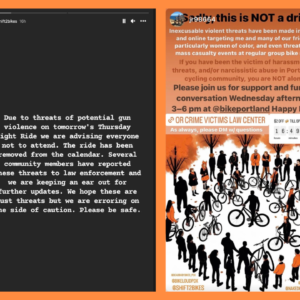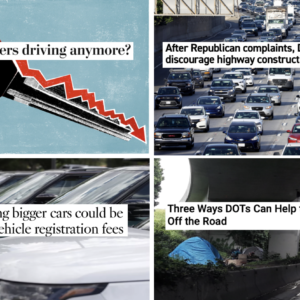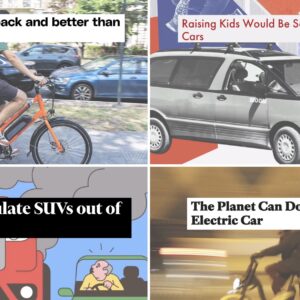
(Photo: Billie Ward)
This week’s Monday Roundup is sponsored by North St. Bags, who invites you to shop their Portland-made selection of bags and accessories at their holiday pop-up shop at 11 NW 5th.
Here are the bike links from around the world that caught our eyes this week:
Getaway bike: A New Yorker shot a bullet into both of an acquaintance’s legs last week, ran two blocks to a Citi Bike dock, checked out a bike and fled.
Smoking gun: When Blackberry service went down for three days last month, traffic collisions dropped 40 percent. (The smartphone pioneer has 44 percent of the market there.)
Postcard advocacy: Minneapolis biking advocates just hand-delivered 3,400 postcards to their city hall in support of the mayor’s plan to spend $790,000 next year on protected bike lanes. Many were gathered at protected bike lane demos set up during the city’s six open-streets events.
Cops on bikes: An L.A. Times writer suggests that every police officer be required to spend at least six months on a bike, since they spend so much time seeing the world through windshields. (They add that driver’s ed might include some of this, too.)
Driving’s bike heritage: “I just started peeling back all the individuals who automobile historians treat as their founding fathers,” transportation historian Carlton Reid tells Sarah Goodyear. “And they all had bicycling backgrounds.” Reid goes on to reveal why so many of them concealed their past.
Bike-union busting: Washington’s Capital Bikeshare, an Alta affiliate, has used a dubious excuse to fire one of its employees who was successfully organizing workers for unionization.
Slower cars: Slowing traffic can actually increase road capacity, because people can drive closer together.
Advertisement
Real-estate impact: Biking is making it nicer to live far from transit stops in “isolated” Brooklyn neighborhoods.
Camas shop: A federal small business loan was key to this Camas bike shop buying a building for itself.
Industrial commuting: The Port of Vancouver is building a multi-use trail to serve bike commuting to its industrial sites.
Rails to trails: One of the never-used tax incentives that Oregon Gov. John Kitzhaber is recommending allowing to die is one for using railroad land for “alternative transportation.”
Perfect crimes: New York’s policy not to prosecute reckless drivers unless they’re caught committing at least two violations at once leads to some shockingly awful drivers going free, reports former New York Times editor Jill Abramson.
Magazine folds: Seven-year-old bike lifestyle mag Urban Velo has had “a good run,” its editor writes in its 45th and final issue.
Speed dispute: The man who killed a woman in a collision while he biked through Central Park claims he was going 8 or 9 mph.
Gipper’s favorite tax: U.S. Rep. Earl Blumenauer (D-Portland) and his Republican colleague Tom Petri of Wisconsin are pointing out that St. Ronald himself was one of the guys behind the 1982 gas tax hike.
If you come across a noteworthy bicycle story, send it in via email, Tweet @bikeportland, or whatever else and we’ll consider adding it to next Monday’s roundup.







Thanks for reading.
BikePortland has served this community with independent community journalism since 2005. We rely on subscriptions from readers like you to survive. Your financial support is vital in keeping this valuable resource alive and well.
Please subscribe today to strengthen and expand our work.
I don’t know where you’ll find support for any tax increase in the next Congress. One of the linked stories sums things up pretty well: Congressional IQ Drops Every Two Years.
It’s one of those things that will just get talked about, like the Hawthorne viaduct rumble strips that still haven’t been removed.
Re;, ‘Cops on Bikes’: it may be that some police officers doing traffic duty lack a sufficiently thorough understanding of what constitutes hazards encountered by people riding, on the pavement in the bike lane.
From what I’ve seem in Portland and Beaverton, they ride only bikes with fat, knobby tires, which is by no means the only type tires used for road riding. Narrower, smooth tires are more the standard, the susceptibility to damage from road debris, of which, officers should have some understanding of. Judges of the court, and many people that drive, too.
Wow–“In Alabama, to cause death while violating a traffic law is to commit homicide, regardless of intent.” (From “Perfect Crimes”.)
We need that here, and everywhere. And I hope it would include the concept that to cause injury while violating a traffic law is to commit attempted homicide.
If drivers operated under this onus, they might understand that there’s nothing accidental about failing to exercise your responsibilities. Then perhaps I could soften Rule Number One, which is the blanket context for everything I teach my daughter about bike safety. That is, “Ride as if they’re all trying to kill you.”
‘That is, “Ride as if they’re all trying to kill you.”’
My neigbhors don’t want to kill me and they don’t want to kill your daughter.
The city of Amsterdam has about ~6 cycling fatalities each year. Even adjusting for population and mode share the Portland rate of ~0.5 per year illustrates how incredibly safe cycling is in this city.
I think Ron meant figuratively trying to kill you, not literally trying to kill you.
I get that but I doubt many parents tell their kids to, “walk as if they’re all trying to kill you”. I hope some day to see cycling become as “normal” as walking for our youth.
Me too. But until then…
My neighbors don’t want to kill cyclists either — I live in close-in SE. It’s the B&T (bridge/tunnel, or Beaverton/Tigard if you like) crowd that acts like they wouldn’t mind much.
“…The city of Amsterdam has about ~6 cycling fatalities each year. Even adjusting for population and mode share the Portland rate of ~0.5 per year illustrates how incredibly safe cycling is in this city.” spare_wheel
That’s an example of statistical numbers sometimes being poorly used, to make a claim contrary to the actual nature of a given situation. Biking amongst motor vehicles, or directly next to them, is fraught with the danger of injury or fatality to people biking.
People all over the Metro area consider biking amongst motor vehicles to be insufficiently safe for them to use biking as a viable mode of travel. Attempts to persuade them through questionable use of statistics, that biking is safe, when they see the contrary, right before their eyes, on the road, isn’t likely to be successful.
Per the OECD, the Denmark and Sweden crash rate per 100,000 population in 2012 was 3. In Portland it was 5.1; Oregon 7.8. Most countries did better than the US (10.7).
Every motorcyclist is taught that mantra when learning how to ride.
Defensive riding/driving saves lives!
Re; ‘Speed Dispute’:
This is a recent article about the collision in New York’s Central Park, in which a guy on a bike collided with and killed a woman crossing a street on foot.
Apparently, he hopes to mitigate the seriousness of his failure to ride safely with regard for vulnerable road users, by maintaining the speed he was traveling, was slower than some people say it was. Whatever his mph speed traveled, he failed to stop for her, ran into and caused her injuries that led to her death. He’s quoted as saying in a personal statement as part of an apology, through his lawyer, “…Please know that this was an unavoidable accident. …”.
New York knows it has a problem with people operating vehicles in a manner that’s dangerous to people on foot. The city has made some efforts to reduce the danger. Without a greater acceptance of personal responsibility on the part of people in the use of their vehicles, the prospects for improvement to the safety of people in the park on foot and trying to cross the street, doesn’t seem good.
RE: the story on the bike origins of car culture: I am soooo tempted, next time I see one of those predictable “I hate bikes” comments, to now reply, with a reference, “Yeah, you and Hitler.” I never thought Godwin’s Law would pop up in my favor.
Good bye Urban Velo…you were a nice read back in the day.
Sorry to hear you go. A similar fate happened to my favourite read PAVED a few months ago too.
Everybody wins when the gas tax goes up because it increases the cost of fuel. As gas goes up in price, people drive less, they find places to live to minimize the amount they drive, there is less pollution from fossil fuel powered vehicles, terrorists in the Middle East have less money for jihads and there is less CO2 generated. As gas prices have gone down the last few months there have been large increases in the sales of cars that get poor fuel economy. This means more greenhouse gases for the life of that those vehicles and more wear on roads since vehicle weight has the largest impact on road damage. Too bad the Portland city council is not as smart as Ronald Reagan.
Gas is $2.25 in Houston right now. It will get lower in 2015, mark my words. I can’t imagine any viable argument at this point to raising the federal gas tax to take a (small) bite out of the federal highway trust fund deficit.
“…As gas prices have gone down the last few months there have been large increases in the sales of cars that get poor fuel economy. …” Jon
Could be true, but sounds like auto manufacturer hype. It’s probably not reliable to connect higher sales of less fuel efficient vehicles to relatively lower gas prices, because the current fuel prices most likely will rise, once OPEC decides to change its game strategy. That could happen anytime.
NBR recently reported that Toyota Prius (which leads hybrid sales) was down 14% in October and GM pickup truck sales had their largest gain on record. Just a blurb I saw; I don’t actually care about or track such things closely but stock market trends are easy to spot and invest in when numbers repeatedly prove the predictability of American consumers.
From the article about bike lobby (where I will be living two weeks from now): “Some bike advocates have suggested that Minneapolis is falling behind other leading biking cities in not moving faster on the protected lanes, which are intended to help riders feel more protected from vehicles and encourage more people to ride”
So the city that is nipping at Portland’s heels, with a mayor proposing to spend $800k on protected bike lanes next year alone, is in danger of itself falling behind. Better get your mojo back, Portland, or eat the dust of more than one city that’s charging forward.
I should add that the two first-ring suburbs immediately bordering Minneapolis to the south (wealthy Edina and traditionally blue-collar Richfield – more or less the Lake Oswego and Milwaukie of Minneapolis, respectively) are falling over themselves to add bike lanes and sidewalks where they are currently lacking. They see the much-better facilities in the second-ring ‘burbs and in the city, along with a huge number of young families moving into the city instead of the traditional suburbs, and realize they have work to do if they want to avoid decay.
It isn’t without controversy, but in both cities the city councils are explicitly talking about how important that is for these communities to improve their non-car amenities in order to attract the next wave of creative types in the Millennial generation.
Warning to Portland: I strongly doubt that Minneapolis’ suburbs are the only ones in America where community leaders are talking about how highly young adults now value active transportation facilities. While I know Portland’s suburbs are working on improving their bike and walking facilities, I don’t hear them putting quite that kind of focus on how important it will be in attracting young adults to their communities – the ones who will work at places like Nike, Columbia and Intel, and who they would presumably want living close by rather than coming in from further-flung places. Yet another way in which we are at risk of falling behind.
“…to attract the next wave of creative types in the Millennial generation. …” GlowBoy
It sounds so much more sexy for cities to say something like that, than for them to have to state the plain reality, which is to simply say they’ve got to provide non-car amenities, because the roads are clogged to capacity with motor vehicles. In many big cities, it seems that roads during rush hour, work about as well as an 80 year old toilet in an old, broken down flat.